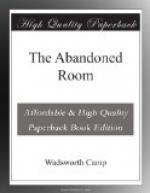Bobby tried to account for Paredes’s friendly manner. That he should have come back at all was sufficiently strange, but it was harder to understand why he should express no resentment for his treatment yesterday, why he should fail to refer to Bobby’s questions at the moment of his arrest, or to the openly expressed enmity of Graham. Only one theory promised to fit at all. It was necessary for the Panamanian to return to the Cedars. His purpose, whatever it was, compelled him to remain for the present in the mournful, tragic house. Therefore, he would crush his justifiable anger. He would make it practically impossible for Bobby to refuse his hospitality. And he had asked for money—only a trifling sum, yet Graham would grasp at the fact to support his earlier suspicion.
Paredes’s arrival possessed one virtue: It diverted Bobby’s thoughts temporarily from his own dilemma, from his inability to chart a course.
Graham, on the other hand, was ill at ease. Beyond a doubt he was disarmed by Paredes’s good humour. For him yesterday’s incident was not so lightly to be passed over. Eventually his curiosity conquered. The words came, nevertheless, with some difficulty:
“We scarcely expected you back.”
His laugh was short and embarrassed.
“We took it for granted you would find it necessary to stay in Smithtown for a while.”
Paredes sipped the coffee which Jenkins had poured.
“Splendid coffee! You should have tasted what I had this morning. Simple enough, Mr. Graham. I telephoned as soon as Rawlins got me to the Bastille. I communicated with the lawyer who represents the company for which I once worked. He’s a prominent and brilliant man. He planned it with some local fellow. When I was arraigned at the opening of court this morning the judge could hold me only as a material witness. He fixed a pretty stiff bail, but the local lawyer was there with a bondsman, and I came back. My clothes are here. You don’t mind, Bobby?”
That moment in the hall when Graham had awakened him urged Bobby to reply with a genuine warmth:
“I don’t mind. I’m glad you’re out of it. I’m sorry you went as you did. I was tired, at my wits’ end. Your presence in the private staircase was the last straw. You will forgive us, Carlos?”
Paredes smiled. He put down his coffee cup and lighted a cigarette. He smoked with a vast contentment.
“That’s better. Nothing to forgive, Bobby. Let us call it a misunderstanding.”
Graham moved closer.
“Perhaps you’ll tell us now what you were doing in the private staircase.”
Paredes blew a wreath of smoke. His eyes still smiled, but his voice was harder:
“Bygones are bygones. Isn’t that so, Bobby?”
“Since you wish it,” Bobby said.
But more important than the knowledge Graham desired, loomed the old question. What was the man’s game? What held him here?




